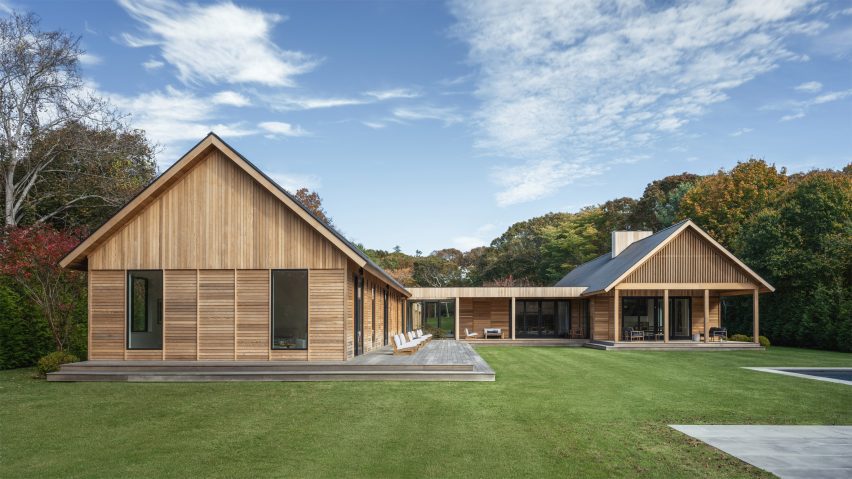New York-based design studio Oza Sabbeth Architects has wrapped an L-shaped beach house in cedar and topped it with a standing seam gabled roof on Long Island.
Known as Osprey's Landing, the Long Island home measures 5,500 square feet (510 square metres) on a 1.3-acre (5,396-square metre) grassed property surrounded by trees. It was completed in 2023.
"The design of the home was founded not only in the strengths of the location but also the liabilities," Oza Sabbeth Architects lead designer Peter Sabbeth told Dezeen. "We sought to design a home that flourished from its challenges.”
Located near Montauk Highway, the team arranged the house and lawn where natural barriers and lush vegetation would create a sense of boundary, reduce the sight and noise of passing cars and provide a textured wall of privacy.
Originally, the team considered a six-bedroom, two-storey house to maximise the site, but quickly realised the upper level would be exposed to the road and opted for a one-storey, ranch-style house arranged in an L-shape formation around a rectangular pool.
It features various wood patterns on the exterior that give way to exposed beams and double-height vaulted ceilings on the inside.
The team wrapped the house in natural Alaskan yellow cedar shakes, applying it in narrow horizontal modules to break the facade into vertical sections.
On the gabled ends, the cedar is turned vertically, disappearing into the roofline in a solid wall or separating into a thin wooden screen over the porch.
The wood-clad house in a variety of natural wood tones is topped with a slate-grey, standing seam metal roof.
"The length of the house along the highway acts as a sound-blocking wall for potential future parties either at the residence or nearby," the team noted.
At the end of a gravel driveway is a detached garage, designed like a smaller version of the house.
The primary entrance is an inset glazed volume placed within a wall of wood. It leads to a corridor that opens up to the patios and breezeway of the back of the house.
Directly across from the entry is a glazed corner surrounding a gravel garden bed. To the left of the entry sits the kitchen and dining area which look out on the porches.
A double-sided fireplace separates the dining room from the large living area, complete with white walls and a tall, gabled ceiling.
"To avoid a formulaic design where cost-effective decisions compromise long-term liveability and charm, we placed wall-to-ceiling windows to frame the backyard view since the house was oriented to the pool – like a reflection pond flowing out of the living room, a chic and private threshold with seamless indoor to outdoor passage," the team said.
Crossing over to the other side of the entry, the bedrooms are lined up along a corridor that runs parallel to a sun deck outside.
"Overall, spacious but restrained interiors with broad wall-windows give way to glowing natural light and open breezeways punctuating the house's flow with green space," said the studio.
The popularity of cedar siding is evident in recent Long Island designs.
Nearby in East Hampton, Oza Sabbath Architects also designed a house wrapped in cedar shingles, but topped it with a series of asymmetrical pyramidal roofs, and Brooklyn-based Desciencelab overhauled an elevated Montauk cabin with grey cedar cladding in long boards across the façade and roof.
The photography is by Alan Tansey.
Project credits:
Builder: Mitch Winston of ELGNY
Interiors: Edna Winston
Engineering (structural + septic engineer): Dilandro Andrews

